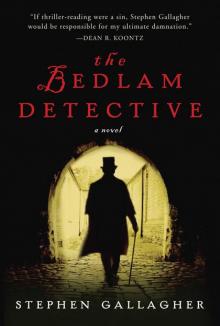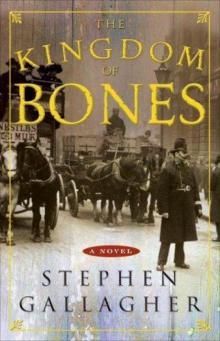- Home
- Stephen Gallagher
The Bedlam Detective Page 30
The Bedlam Detective Read online
Page 30
Sebastian looked down at the rifle in his hands. It was a large-bore, single-shot buffalo gun. Little wonder that it had caused such damage at this range.
“You see?” Sir Owain said, with a sideways glance toward Arnot’s body. “They do. They walk among us. Invisible to all.”
Evangeline suddenly spasmed and began a coughing fit just as the vehicle bringing Stephen Reed made its noisy entrance into the Hall courtyard.
Stephen Reed jumped down from the wagon and was arrested by the sight before him. Sebastian with the hunting rifle. The bedraggled sea creature that was Evangeline. Sir Owain crouching over her.
And the body of Thomas Arnot, his head topped like an egg, his body’s blood now snaking across the courtyard stones in search of a drain.
Sebastian laid down the rifle and helped Sir Owain to lift Evangeline to a sitting position. She was dazed and seemed not to know where she was.
“Who did this?” Stephen Reed said, torn between the fascinating sight of the mutilated chauffeur and concern for Evangeline.
Sebastian was about to speak, but Sir Owain spoke first.
“I did,” he said, and a peculiar little smile played about his lips.
He said, “I slew the beast.”
FIFTY-THREE
It was a bright spring day in London and Stephen Reed was walking up Bell Yard from Fleet Street, behind the Royal Courts of Justice on his way to the chambers where Evangeline Bancroft worked. They’d arranged, by letter, to meet that day during the half hour she had for lunch. But Stephen had taken a room in a boardinghouse off the Strand and was intending to spend several of his leave days in town. He was hoping that she might consent to allowing him to spend some of that time in her company.
He had much to tell her. The tinker had been freed, without apology. A billhook in Thomas Arnot’s workshop had been matched to the broken piece held in evidence. With Arnot gone, piecing his story and his motives together proved difficult. He had become public property, with one person’s theory as good as any other’s. A number of learned men, some of them from distant parts of Europe and all eager to dissect the psychology of this very twentieth-century phenomenon, had descended upon the resort and been thoroughly fleeced of their cash in return for interviews and information. Some of the information fed to them was even based in fact. One of the few conclusions that could be agreed upon was that it must have been as a child that Arnot had first noticed Grace; barely out of childhood himself, he’d watched her when her father and his own had done some dealing in horses.
A search of his living quarters above the former stables had revealed accommodations that were both squalid and austere, as if a monk had elected to live in a pigsty. A small collection of well-thumbed French postcards had been found hidden above a beam and, behind the laths of the wall, items of children’s clothing. They suggested other assaults and disappearances of which the police had known nothing.
Despite knowing of Arnot’s guilt from the day of her own assault, Grace had not given him up. Such was her nature. She never gave anything to the authorities, her lifelong enemies. Whatever knowledge Grace had, she hoarded for her own advantage. When the time was right, it appeared that she had blackmailed Arnot. Unable to make a living in a dying trade, she’d set out to supplement her income from his.
In her own mind, there was probably a certain aptness to this. He’d done her harm, and now it was his time to pay, with money he earned by the machines that were wiping out her livelihood. Little matter that the evidence she could threaten him with-nothing more than her own word and a livery button from his uniform-was so insubstantial. It had been enough to compel him.
The rest was guesswork. The most credible theory was that when Sir Owain’s fortunes declined to the point where he could no longer pay wages, Arnot was trapped. Grace cared nothing for his difficulty-it was his problem, not hers. Let him steal if he had to. Evangeline spoke of “poor Grace,” but inside poor Grace was a heart of flint. Only such a heart could let more children suffer, knowing what she knew. She had survived; so must they. And if they did not … such were the laws of the human jungle.
Unable to pay, unable to preserve himself by any other means, Arnot had silenced Grace and searched for the evidence she’d claimed to hold.
Stephen Reed now reached the Inns of Court. He asked for directions of one of the servants of the Inn, and quickly found Evangeline’s building.
He was early. As he waited in the square, watching the benchers pass and the workers in the boiler rooms of justice going about their secret business, he rehearsed the speech that he intended to follow.
He meant to offer himself to Evangeline, if she would have him.
And if she would not, he could wait.
At around the same time, in a belowground passage built some thirty years before to serve temporary exhibition grounds in South Kensington, Sebastian was heading for an appointment of his own. He, too, was thinking of Evangeline May Bancroft, and the lightless shaft under the Thames where he had once done his best to sustain the young woman’s spirits. This tunnel was wide and spacious, with a faint breeze drawing through.
Sir Owain Lancaster had been tried for the manslaughter of Hubert Sibley. He had insisted on representing himself in court, which had all but guaranteed the trial’s outcome. After Sir James Crichton-Browne spoke on his mental condition, the jury returned a verdict of not guilty by reason of insanity, and Sir Owain was detained indefinitely by order of the Crown. The Arnside estate and his remaining assets were placed under the control of a Master of Lunacy appointed by the Lord Chancellor’s office. His late wife’s family petitioned for control over what remained of his dwindling wealth, but their petition was denied.
Sir Owain had applied to his administrators to be allowed to make a cash gift to Sebastian, as a sign of gratitude. He hoped that it might enable Sebastian to move his family into more suitable housing. The Master of Lunacy had forbidden the gift, deeming it improper, but Sir James had felt moved to raise Sebastian’s pay in consequence. For the moment, Sebastian remained in Southwark.
As far as Sebastian was aware, Sir Owain had adjusted to his lot, rediscovered his faith, and spent his days in the serene anticipation of an eventual reunion with his loved ones. For his own part, Sebastian suffered occasionally from vivid and emotional memories in which he relived the involuntary delirium that Sir Owain had inflicted upon him. But these episodes were always brief and had begun to diminish.
He ascended the stairs to leave the passageway at its newly opened entrance before the natural history museum, the so-called Cathedral of Nature dedicated mostly to the display and worship of bones and taxidermy. Its iron galleries and terra-cotta detailing made for a unique blend of industry and Byzantium. He’d been here several times, mostly at weekends, since Robert had made his first visit with Dr. Percival.
Today was different, and somewhat special. Percival Langdon Down had arranged an interview for Robert with the Keeper of Paleontology. Despite the boy’s lack of formal training, Langdon Down had persuaded the Keeper that his depth of interest and effortless power of analysis might fit him for employment here. As a boy attendant to begin with, perhaps moving on to become a junior assistant in the Department of Geology. He surely had the necessary ability. Robert even had the Latin, entirely self-taught.
Sebastian was to meet the three of them in the Great Hall, but only Frances was waiting there. She had her best coat and bonnet on.
He said, “Am I late? I didn’t think I was.”
“You’re not late,” Frances said. “The Keeper sent a message down and Robert went up early.”
“Shouldn’t we be there?”
“No, Sebastian,” Frances said. “He isn’t a child. He went off perfectly happy with Doctor Percival. He doesn’t need us.”
She noted his discomfort, and it made her smile.
“It’ll soon be over,” she said. “And I’m sure he’ll do well. Let’s walk for a while. Take your mind away from it.”
&nb
sp; They walked out of the Great Hall past Huxley’s statue, down the gallery of the East Wing. Pier cases of specimens made a series of alcoves to either side, from early man to the mastodon. For once, they didn’t have to stop every few paces while Robert picked out some fossil and launched into an eager lecture. They passed the exhibits by, their thoughts elsewhere.
“I wish Elisabeth could be here to see this day,” he said.
“I know you do. This will be everything you both wanted for him.”
“Everything she wanted,” he said. “I’m not sure I had her faith.”
“She had her doubts too, you know. She believed in him. But I think she would have found it hard to let him go.”
He looked at her. “Really?”
Frances nodded. “You knew her best. But I knew her longest. She was the same when we were children. She could deal with disappointment if it was her own. But she always suffered at the thought of it being borne by anyone else.”
The gallery ended in a square pavilion with no exit. On pedestal number ten, near the center of the room, stood the plaster skeleton of a Megatherium from Buenos Ayres, an enormous extinct animal with a frame resembling that of a giant sloth.
This was the exhibit that Robert had first led him to see. The Megatherium was the unseen beast that Sir Owain had imagined he might bag and bring home. Its skeleton was thick-boned and barrel-chested, and it had been set in a rearing position with a plaster tree to balance against. As a result of its raised stance, its skull was up almost as high as the ceiling.
They turned to walk back. There was no way of knowing how long the Keeper’s interview would take.
“You know,” Sebastian said, “if Robert gets this job, he’ll be the one member of the family with a reliable weekly income.”
“One step at a time, Sebastian.”
“But you’re right. He deserves whatever the world can offer him. And you, Frances. I owe you so much. But do you never wonder how your life might have been without us?”
“I’d miss Southwark.”
“Really?”
It took him a moment to realize that Frances was teasing him. He hadn’t been expecting it. His credulity amused her no end. They began their return to the Great Hall.
“Life will be better than this, Frances,” he said. “I promise you it will.”
She took his arm.
“I don’t mind,” she said.
POSTSCRIPT
Thereis, in one final piece of business, the matter of a short length of moving-picture film. The camera negative was returned, in due course, to Florence Bell’s family, who could bear neither to view it nor to throw it away. It was kept in an attic where the nitrate stock began to deteriorate, as nitrate stock will. When the film can was rediscovered and finally opened, some decades later, the core was a solid lump and the outer layers were crumbling. All else within the can was dust, rust, and vinegar.
The print that Sebastian Becker turned over to the Crown Prosecutor’s office went into a government archive. The archive was thinned and most of its silver was reclaimed for the war effort in 1915.
No clear understanding of the brief sequence’s content was ever agreed upon.
FB2 document info
Document ID: fbd-710ab2-e43e-fb45-4281-5e66-314c-e4112c
Document version: 1
Document creation date: 15.02.2012
Created using: calibre 0.8.39, Fiction Book Designer, FictionBook Editor Release 2.6 software
Document authors :
Unknown
About
This file was generated by Lord KiRon's FB2EPUB converter version 1.1.5.0.
(This book might contain copyrighted material, author of the converter bears no responsibility for it's usage)
Этот файл создан при помощи конвертера FB2EPUB версии 1.1.5.0 написанного Lord KiRon.
(Эта книга может содержать материал который защищен авторским правом, автор конвертера не несет ответственности за его использование)
http://www.fb2epub.net
https://code.google.com/p/fb2epub/

 The Boat House
The Boat House The Bedlam Detective
The Bedlam Detective Valley of lights
Valley of lights The Kingdom of Bones
The Kingdom of Bones